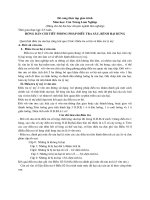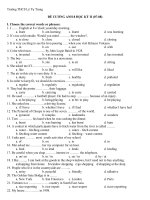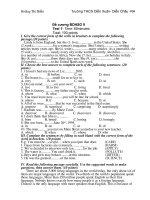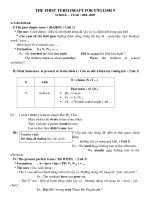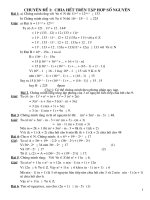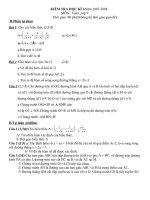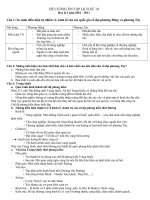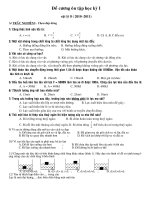DECUONG 9(0809)
Bạn đang xem bản rút gọn của tài liệu. Xem và tải ngay bản đầy đủ của tài liệu tại đây (111.29 KB, 16 trang )
THE FIRST TERM DRAFT FOR ENGLISH 9
SCHOOL – YEAR : 2008 -2009
A/ GRAMMAR
I) The past simple tense ( thì QKĐ) ( Unit 1)
* The use ( Cách dùng) : diễn tả một hảnh động đã xảy ra và chấm dứt trong qúa khứ.
* Các cụm từ chỉ thời gian thường được dùng trong thì này là : yesterday, last Sunday/ week /
year...,
three days/ five minutes ago ....
* Formation : S + V
2
/V
ed
+ ....
Ex : He watched this film last night. Did he watch this film last night ?
The children were at school yesterday. Were the children at school
yesterday?
II) Wish Sentences at present or in the future ( Câu ao ước ở hiện tại / tương lai) ( Unit 1)
S wish
O = clause (S +V ...)
S wish(es)
Past tense ( thì QK)
• Be --> were
• Vt --> V
2
/V
ed
• Vk --> Would/ could/ might + Inf ...
Ex : I wish I were a famous singer like My Tam.
Mary wishes he wrote to her more often.
They wish the weather would be nice.
Lan wishes they didn’t come late.
III) * Cấu trúc này dùng để diễn tả thói quen, hành
động
thường xảy ra trong qúa khứ. ( Unit 1)
Ex : We used to go fishing late in the afternoon.
We usually went fishing late in the afternoon.
IV) The present perfect tense ( Thì HTHT) ( Unit 2)
* Formation : S + have / has + PP( V
3
/V
ed
) + ...
* The uses ( Các cách dùng )
- The 1
st
use:diễn tả hành động vừa mới xảy ra. Thường dùng với trạng từ “ just: vừa mới “ .
Ex : The students have just gone out.
- The 2
nd
use : diễn tả hành động chưa xảy ra . Thường dùng với trạng từ “ (not) ...yet :
chưa”.
Ex : Has Mrs Young seen Thien Mu Pagoda yet ?
No, she hasn’t seen it yet .
Used to + Inf
Đã từng, đã thường làm việc gì đó
- The 3
rd
use : diễn tả hành động đã xảy ra nhưng không rõ thời gian . Thường dùng với các
trạng
từ chỉ thời gian như “ already : đã, rồi”, “ lately, recently : mới đây , gần đây “.
( Cần lưu ý sự khác nhau với thì quá khứ đơn).
Ex : We’ve had breakfast already . / We’ve already had breakfast .
John‘s phoned us recently.
John phoned us two days ago.
- The 4
th
use : diễn tả hành động bắt đầu từ một thời điểm ở qúa khứ mà còn kéo dài đến hiện
tại
hoặc tới tương lai. Thường dùng với hai giới từ chỉ thời gian “since : từ” và “ for : khoảng “.
Ex : We’ve known each other for years.
I have learned English since grade 6
th
.
V) Passive Voice ( Thể Bò Động ) ( Unit 2)
* General Formation : ... Be + PP (V
3
/V
ed
) + ( by O ) ...
1) The present simple: S + am/is/are + PP (V
3
/V
ed
) + ( by O ) ...
2) The past simple : S + were/was + PP (V
3
/V
ed
) + ( by O ) ...
3) The future simple : S + will + be + PP (V
3
/V
ed
) + ( by O ) ...
4) The present perfect : S + have/has + been + PP (V
3
/V
ed
) + ( by O ) ...
5) Verbs after modals : S + Vk + be + PP (V
3
/V
ed
) + ( by O ) ...
* Nêu các bước đổi sang bò động :
..................................................................................................................................
..................................................................................................................................
..................................................................................................................................
..................................................................................................................................
Ex : They built our school last year . ( Họ xây ngôi trường này năm ngoái) )
Our school was built ( by them ) last year . ( Ngôi trường này được xây năm ngoái )
Ex : The boss will answer your question soon.( Câu chủ động )
Your answer will be answered by the boss soon. ( Câu bò động )
VI) Prepositions of time ( Giới từ chỉ thời gian ) ( Unit 3)
at (giờ), in (tháng/năm/buổi sáng,chiều,tối/mùa) , on (thứ / ngày / ngày tháng năm), for
(khoảng thời)
gian) , after ( giờ) , from ...to..., between +giờ + and + giờ ...
Ex : at 4 o’clock on Sunday
In 2000 on September 5
th
In September for 3 days
In the morning/ afternoon/ evening after 9 pm
In Spring/ Summer/ Fall / Autumn from 9 am to 4 pm
Between 9 am and 4 pm
VII) Adverb clauses of result ( Mệnh đề trạng ngữ chỉ kết qủa ) ( Unit 3)
Ex : The weather was very bad , so we didn’t go .
Câu trên còn được viết lại như sau :
We didn’t go because the weather was very bad .
VIII) Direct and Indirect/ Reported Speech ( Câu nói trực tiếp và gián tiếp) ( Unit 4 )
1) Khi viết từ câu nói trực tiếp sang câu nói gián tiếp ta cần thay đổi các yếu tố sau :
a) Thay đổi thì ( áp dụng qui tắc lùi thì ) , đổi các từ chỉ thời gian và nơi chốn theo
bảng sau :
Direct Speech Indirect (Reported) Speech
present simple tense ( S + V(s/es) ...) past simple tense ( S + V
2
/V
ed
...)
present progressive tense
( S + am/is/are + V-ing ...)
Past progressive tense
( S + were/was + V-ing ...)
Future simple tense
( S + will/shall + Inf ...)
S + would + Inf ...
can / may could / might
must : phải had to
this : đây, này that : đó, kia
these : đây, này those : đó, kia
here : đây there : kia
now : bây giờ then : lúc đó, lúc bấy giờ
today : hôm nay that day : hôm đó, hôm ấy
tomorrow : ngày mai the following/next day: ngày kế tiếp, ngày sau
đó.
b) Thay đổi chủ ngữ, tân ngữ hoặc các dạng sở hữu cho phù hợp với cách nói gián tiếp.
2) Trước khi đổi sang câu nói gián tiếp, ta cần xác đònh xem câu nói trực tiếp là câu kể ( khẳng
đònh,phủ dònh) hay là câu hỏi Yes-No, hay là câu hỏi có từ để hỏi để có cách đổi cho phù hợp.
Bởi vì mỗi loại câu có một cách đổi riêng.
a) Statements ( câu kể )
Ex : “ I am your new teacher .”
Mr Pike said to us he was our new teacher .
Ex : “ We don’t know what to do now “
The students told me that they didn’t know what to do then.
b) Yes-No questions
Ex : “ Do you go to school with your friends ?”
He asked her if/whether she went to school with her friends.
Ex : “ Don’t you take a bus to work today?”
The man asked me if I didn’t take a bus to work that day.
@ If = whether : có phải ...... hay không
c) WH-questions
Ex : “ Where are you from ?
I asked the girl where she was from.
Ex : “ Why do you wait for me here ?”
She asked him why he waited for her there.
IX) Tag _ questions ( Câu Hỏi Đuôi ) (Unit 5)
• Câu hỏi đuôi gồm mấy vế ?Các vế được tách biệt bởi dấu gì ? Hai vế có thể như thế
nào ? Nếu vế trước dùng động từ “be” hoặc “Vk’ thì vế hỏi dùng động từ nào ? Nếu vế
trước dùng Vt thì vế hỏi dùng cái gì ? Nếu vế trước đã có trợ động từ thì vế hỏi dùng cái gì
? Chủ ngữ của vế hỏi luôn là danh từ hay đại từ ? Câu hỏi đuôi có cách dòch và cách trả
lời giống câu hỏi nào ?
Ex : You are a newcomer here , aren’t you ? = Are you a newcomer here ?
The children couldn’t play those games, could they ?
Peter visited Hue last summer vacation, didn’t he ?
You’ve studied French fo three years, haven’t you ?
X) Gerunds ( Danh động từ ) (Unit 5)
1) Danh động từ là gì ? : DĐT là những động từ thêm “ing” và đóng vai trò như là danh
từ
@ Lưu ý : những động từ thêm “ing” mà diễn tả hành động đang xảy ra người ta gọi là
hiện
tại phân từ .
Ex : She is drawing a picture. ( Cô ấy đang vẽ một bức tranh)
She likes drawing . ( Cô ta thích vẽ )
2) Danh động từ đứng :
a) Sau các giới từ : at, on, in, by, from, ....
Ex : I’m interested in learning English .
We can earn money by collecting waste paper.
b) Sau một số động từ như : like, love, enjoy( thích, thưởng thức), dislike ( không
thích,
ghét) = hate, practice ( thực hành), suggest ( đề nghò ) , mind ( phiền ), finish (kết thúc )...
Ex : I hate getting up early.
He suggested going out for dinner.
Children enjoy eating ice-cream.
B) CÁC DẠNG BÀI VIẾT
1) Viết thư cho bạn hoặc người thân kể về chuyến du lòch của mình. ( Unit 1, page 11)
2) Viết một bài văn bày tỏ ý kiến của mình về một vấn đề nào đó để thuyết phục mọi
người ủng
hộ ý kiến của mình. ( Unit 2 , page 18 & 19)
3) Viết một bài văn kể về chuyến du lòch ( Unit 3, page 26 & 27)
4) Viết một lá thư yêu cầu cung cấp thêm thông tin về các trung tâm / trường ngoại ngữ
mà chúng
ta muốn theo học . ( Unit 4 , page 37)
5) Viết một bài văn về lợi ích mà Internet mang lại cho chúng ta . ( Unit 5, page 44)
C) CÁC BÀI ĐỌC VÀ TỪ VỰNG THEO 5 CHỦ ĐIỂM CỦA 5 BÀI HỌC
D) EXERCISES ( Bài Tập )
I) Underline the words or phrases you choose ( gạch chân những từ hoặc cụm từ mà em
chọn )
1) We were really ( impress/ impressed/ impression) by the beauty of Da Lat.
2) Ha Noi is not different ( with / to / from ) Kualar Lumpur.
3) I wish Mary ( lived / live / will live ) here now.
4) This book consists ( of / about / on ) two chapters.
5) When we were children, we used to (swim / swam / swimming ) in this river.
6) We wish they ( will come / can come / would come ) there tomorrow.
7)The Malaysian unit ( in / of / off) currency is the ringgit.
8) Maths and Literature are ( adding / compulsory/ optional) subjects for students in
Vietnam.
9) Young people are fond of ( wearing / wear / wore ) Jeans.
10) Many designers take ( inspire / inspiration / inspirer ) from Vietnam’s ethnic
minorities.
11) He ( lived / has lived / lives ) in apartment in Ha Noi since last week.
12) My car ( repaired / is repaired / was repaired ) yesterday.
12) What clothes do you usually wear ( in / for / on ) the weekend ?
13) The Ao Dai is the ( traditional / casual/ beautiful ) dress of Vietnamese women.
14) Four of us will go ( for / on / at) a pinic tomorrow.
15) There is a meeting ( at / from / between) 8 am and 11 am.
16) The girl has ( already / last Sunday/ recently ) told me about this .
17) It rained heavily, ( because / and/ so ) we couldn’t eat out.
18) They’ve stayed there ( in / for / since ) 5 days.
19) I wish you (didn’t do / don’t do / won’t do ) it again .
20) Mr Phong is a very strict ( examiner / examination / examine ).
21) I think you should ( improve / take / attend) your writing skill.
22) He said he ( liked/ likes / liking ) playing football.
23) I asked her where ( she come / her came / she came ) from.
24) The teacher asked him why ( didn’t he do / he didn’t do / he doesn’t do ) the test.
25) If we go to the university, we can live in a ( dormitary / hotel / inn ) on campus.
26) She told me she ( would have to / had to / will have to ) go to Nha Trang the following
day.
27) They enjoy ( play / playing / played ) baseball after school.
28) Sorry. You can’t get access ( with / to / for ) the internet now.
29) He thinks that chatting on the internet is ( time- consuming/ information / town criers )
30) The internet is a very fast way to get ( information / informative / inform )
31) She preferred (going / to go / went) to the beach.
32) You know her , ( do you/ don’t you/ didn’t you ) ?
33) By ( learn / learning / to learning ) English, you can get access to the world’s
development.
34) The next stage in the development of TV is ( interact / interactive / interaction ) TV.
35) Peter never goes to school late , ( does he/ does Peter / doesn’t he )?
II) Change into the passive ( Ñoåi sang bò ñoäng )
1) We do our homework every day .
...................................................................................................
2) Paula decorated the room yesterday.
...................................................................................................
3) They have repaired this office since May.
...................................................................................................
4) The police will find out the missing child.
...................................................................................................
5) Did your father build that house ?
...................................................................................................
6) What should we do now ?
...................................................................................................
7) They will repair this road next year.
...................................................................................................
8) We must prepare our lesson well before going to school.
...................................................................................................
9) Vietnamese women often prefer to wear modern clothing at work
...................................................................................................
10)They are going to build a new bridge in the area.
...................................................................................................
11)People should stop experiments on animals.
...................................................................................................
12)They made jean cloth completely from cotton in the 18
th
century.
...................................................................................................
III) Write reported speech ( Vieát caâu noùi giaùn tieáp )
1) “ I can’t do these now “
Maryam said ........................................................................................................
2) “ we study unit 5 today.”
The teacher said to us ...........................................................................................
3) “ Are you Vietnamese ?”
The guider asked me ............................................................................................
4) “ Do you like your school ?”
He asked her .......................................................................................................
5) “ Where will your children go with you tomorrow ?”
I asked them ........................................................................................................
6) “ Why don’t you answer my questions ?”
I asked him ..........................................................................................................
7) “ Why do you want to take the course?”
She aksed me ......................................................................................................
7) “ How much are the course fees?”
I asked her ...........................................................................................................
8) “ How many languages can you speak?”
She aksed me .......................................................................................................
8) “ Who do you live with?”
The teacher aksed me ............................................................................................
9) “ Are you the newcomer here?”

